English Synonyms I
初中英语 常用同义词辨析 English Synonyms A B2 素材
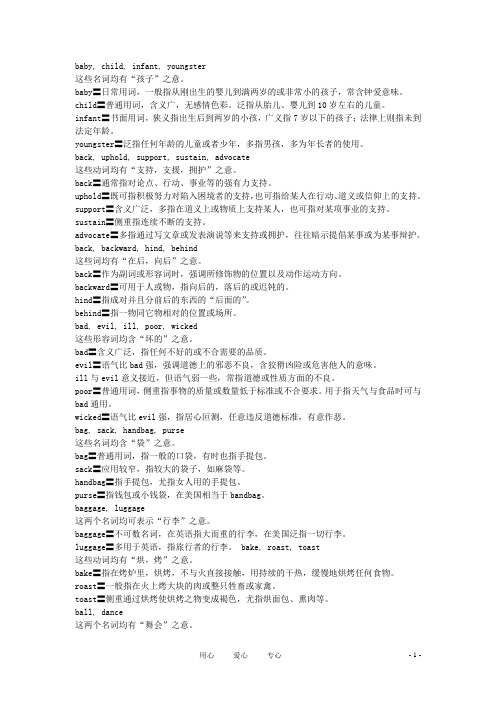
baby, child, infant, youngster这些名词均有“孩子”之意。
baby〓日常用词,一般指从刚出生的婴儿到满两岁的或非常小的孩子,常含钟爱意味。
child〓普通用词,含义广,无感情色彩。
泛指从胎儿、婴儿到10岁左右的儿童。
infant〓书面用词,狭义指出生后到两岁的小孩,广义指7岁以下的孩子;法律上则指未到法定年龄。
youngster〓泛指任何年龄的儿童或者少年,多指男孩,多为年长者的使用。
back, uphold, support, sustain, advocate这些动词均有“支持,支援,拥护”之意。
back〓通常指对论点、行动、事业等的强有力支持。
uphold〓既可指积极努力对陷入困境者的支持,也可指给某人在行动、道义或信仰上的支持。
support〓含义广泛,多指在道义上或物质上支持某人,也可指对某项事业的支持。
sustain〓侧重指连续不断的支持。
advocate〓多指通过写文章或发表演说等来支持或拥护,往往暗示提倡某事或为某事辩护。
back, backward, hind, behind这些词均有“在后,向后”之意。
back〓作为副词或形容词时,强调所修饰物的位置以及动作运动方向。
backward〓可用于人或物,指向后的,落后的或迟钝的。
hind〓指成对并且分前后的东西的“后面的”。
behind〓指一物同它物相对的位置或场所。
bad, evil, ill, poor, wicked这些形容词均含“坏的”之意。
bad〓含义广泛,指任何不好的或不合需要的品质。
evil〓语气比bad强,强调道德上的邪恶不良,含狡猾凶险或危害他人的意味。
ill与evil意义接近,但语气弱一些,常指道德或性质方面的不良。
poor〓普通用词,侧重指事物的质量或数量低于标准或不合要求。
用于指天气与食品时可与bad通用。
wicked〓语气比evil强,指居心叵测,任意违反道德标准,有意作恶。
bag, sack, handbag, purse这些名词均含“袋”之意。
初中英语 常用同义词辨析 English Synonyms O 素材
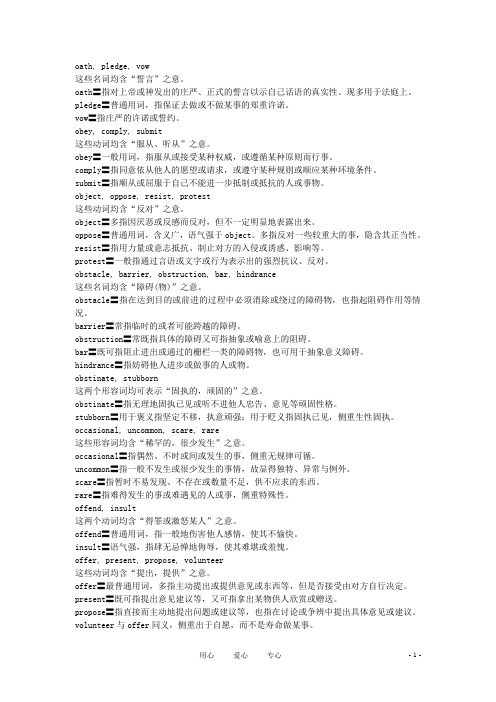
oath, pledge, vow这些名词均含“誓言”之意。
oath〓指对上帝或神发出的庄严、正式的誓言以示自己话语的真实性。
现多用于法庭上。
pledge〓普通用词,指保证去做或不做某事的郑重许诺。
vow〓指庄严的许诺或誓约。
obey, comply, submit这些动词均含“服从、听从”之意。
obey〓一般用词,指服从或接受某种权威,或遵循某种原则而行事。
comply〓指同意依从他人的愿望或请求,或遵守某种规则或顺应某种环境条件。
submit〓指顺从或屈服于自己不能进一步抵制或抵抗的人或事物。
object, oppose, resist, protest这些动词均含“反对”之意。
object〓多指因厌恶或反感而反对,但不一定明显地表露出来。
oppose〓普通用词,含义广,语气强于object。
多指反对一些较重大的事,隐含其正当性。
resist〓指用力量或意志抵抗、制止对方的入侵或诱惑、影响等。
protest〓一般指通过言语或文字或行为表示出的强烈抗议、反对。
obstacle, barrier, obstruction, bar, hindrance这些名词均含“障碍(物)”之意。
obstacle〓指在达到目的或前进的过程中必须消除或绕过的障碍物,也指起阻碍作用等情况。
barrier〓常指临时的或者可能跨越的障碍。
obstruction〓常既指具体的障碍又可指抽象或喻意上的阻碍。
bar〓既可指阻止进出或通过的栅栏一类的障碍物,也可用于抽象意义障碍。
hindrance〓指妨碍他人进步或做事的人或物。
obstinate, stubborn这两个形容词均可表示“固执的,顽固的”之意。
obstinate〓指无理地固执已见或听不进他人忠告、意见等顽固性格。
stubborn〓用于褒义指坚定不移,执意顽强;用于贬义指固执已见,侧重生性固执。
occasional, uncommon, scare, rare这些形容词均含“稀罕的,很少发生”之意。
english vocabulary
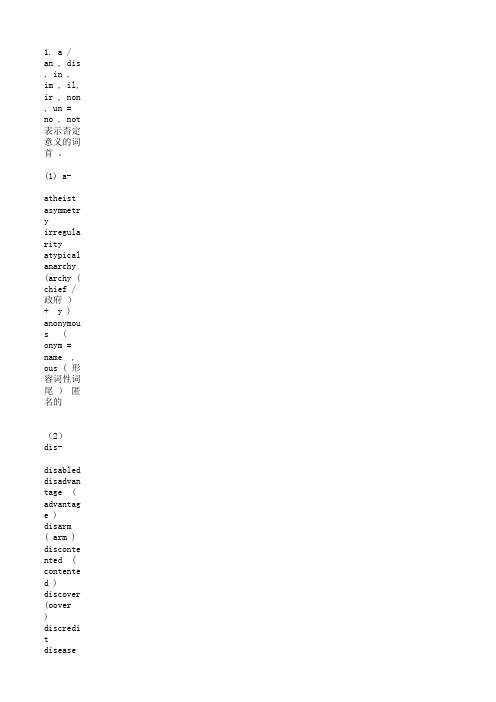
uncivili sed ( civilise d) uncomfor table ( comforta ble) uncommon ( common) uncondit ional ( conditio nal ) undeniab le ( deniable ) undesira ble ( desirabl e) undiscip lined ( discipli ned ) undoubte dly ( doubt ) uneasy unemploy ed unfair unethica l synonyms ( immoral ) unfavour able ( favourab le ) ungratef ul ( grateful ) unhealth y unimagin able ( imaginab le )
(8) un-
unable ( able ) unaccept able (accepta ble ) unavaila ble ( availabl e) unavoida ble(avoi dable) unbearab le ( bearable ) unbeliev able (believa ble)
4) . ag (+g)
aggressi ve ( progress ive ) aggregat e( segregat e) aggrieve ( grieve )
5) . Al+ (l )
allure ( lure ) allocate ( locate ) allergic
synonymous antonymous
unworth ( unworth )
2. de , di , dis , se = away , aside 表 示“ 离 开,出 去”等 涵义
english synonymstalk听力原文答案
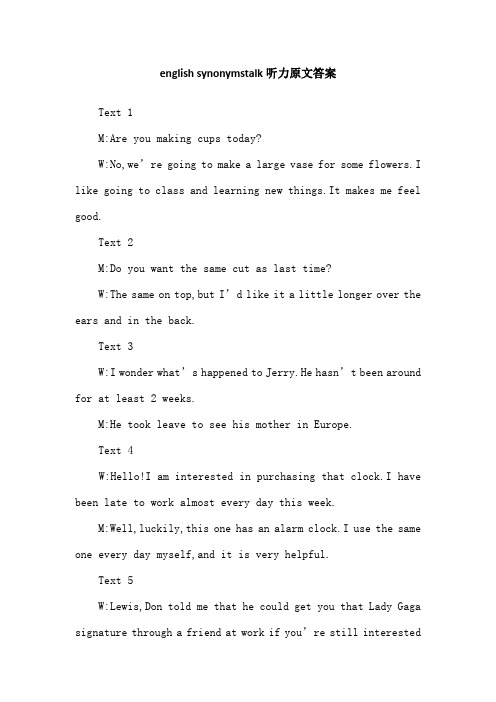
english synonymstalk听力原文答案Text 1M:Are you making cups today?W:No,we’re going to make a large vase for some flowers.I like going to class and learning new things.It makes me feel good.Text 2M:Do you want the same cut as last time?W:The same on top,but I’d like it a little longer over the ears and in the back.Text 3W:I wonder what’s happened to Jerry.He hasn’t been around for at least 2 weeks.M:He took leave to see his mother in Europe.Text 4W:Hello!I am interested in purchasing that clock.I have been late to work almost every day this week.M:Well,luckily,this one has an alarm clock.I use the same one every day myself,and it is very helpful.Text 5W:Lewis,Don told me that he could get you that Lady Gaga signature through a friend at work if you’re still interestedin getting it.M:Still interested in getting it?Um,I have every single Lady Gaga CD,and my wall is covered in her pictures!If I ever get a pet dog,I’ll probably name her Gaga,that’s how into her I am,so…Text 6W:Look at those pictures!They’re fantastic!You’re so talented,James.And wow,what a cool camera!M:It’s a Nikon D200,and it’s really easy to use.But now,I’m planning to save up for a new Olympus E1.It will definitely cost me an arm and a leg.W:Sounds quite professional.Anyway,would you please bring your camera with you next Sunday and take some pictures of us while we’re playing tennis?M:Sure,you got it.Text 7M:There is just one problem,madam.Your driver’s license is no longer valid.W:What?M:Yes.Today is the 19th,and your driver’s license was valid through the 17th.I’m afraid we can’t accept it.Do you have another form of ID?W:Not with me.My passport is at home,but that’s 30 minutes away.M:I do apologize,but this is our policy.If you want to continue with your deposit,you might have to go home and get it.W:That’s OK.I’ll just come back tomorrow with my passport.I need to try to get a new license now.Otherwise,I won’t be able to drive home!Text 8W:Can I help you?M:Oh,I’m just looking,thanks.Well,actually,I’m looking for something for my sister.W:And what exactly are you looking for?M:I don’t really know.A dress?W:Right.Well,what color does your sister usually wear?M:Oh,dear…W:Okay,what color are her eyes?M:Green.W:OK,purple usually suits people with green eyes.M:Oh,great,purple’s fine.W:Now,what size is she?M:Um,well…she isn’t very big,but she’s not particularlythin,either.W:That’ll be a medium,then.Well,we have this rather nice silk evening dress here…M:Good,I’ll take it.How much is it?W:$70,sir.How would you like to pay?M:Seventy?!Uh,by credit card,please.W:Fine.If you could just sign…M:Here you are.Goodbye.W:Just a minute,sir.Here’s your receipt.M:Oh yes,uh…can she exchange it if it doesn’t fit her?W:Yes,but she needs to bring the receipt.Text 9W:Young man,I couldn’t help but overhear your conversation with the gentleman who just gave you directions.M:Uh-huh…W:I think he must be confused.The directions he gave you are all wrong.If you follow them,you’ll have a lovely ride,but you’ll end up at the zoo.M:What should I do,then?W:Come with me.I’m heading in the direction where you can catch the bus you want.We’ll just continue down Gold Road here for a few minutes.M:OK,great.Thank you.…W:Here we are.This is the corner of Wall Street and Gold Road,and here’s your bus stop.Take the F-1 down to the river,and get off at Riverside Road.M:And that’s where the church is?W:No,transfer there to the L-5 going north.The end of the line for L-5 is just across the street from Riverside Church.The whole ride shouldn’t take you more than 30 minutes.M:Thanks.I’m glad you set me straight.Is that my bus coming down the street now?W:Yes,it is.I hope you have exact change.The driver doesn’t give change to passengers.M:I have quite a few quarters with me.Thanks again!Goodbye.Text 10M:Many young girls dream of being models.Now,my first question:How were you able to make your dream a reality?W:I actually spent my childhood being a model.My mother put me in TV commercials and other advertisements when I was just a small baby.M:Do you think that modeling has influenced your life at all?W:It’s difficult to say.Sometimes I feel like it’s hard to make friends when you are a model.It seems like all they care about is my looks.I travel a lot,and that also puts a lot of stress on any relationships that I have.M:What is your favorite part of being a model?W:I really like all of the traveling that I get to do.I have been able to go to Europe and Latin America and a lot of other beautiful locations around the world.I think the best thing,though,is having people look at me and think that I’m beautiful.I love the attention.M:Now,finally,do you have any advice for young girls that want to be models?W:Sure!I just want to tell you guys never to give up,and don’t let anyone ever tell you that you are not beautiful…because everyone is beautiful in their own way!。
英语常用同义词辨析EnglishSynonymsC(四)
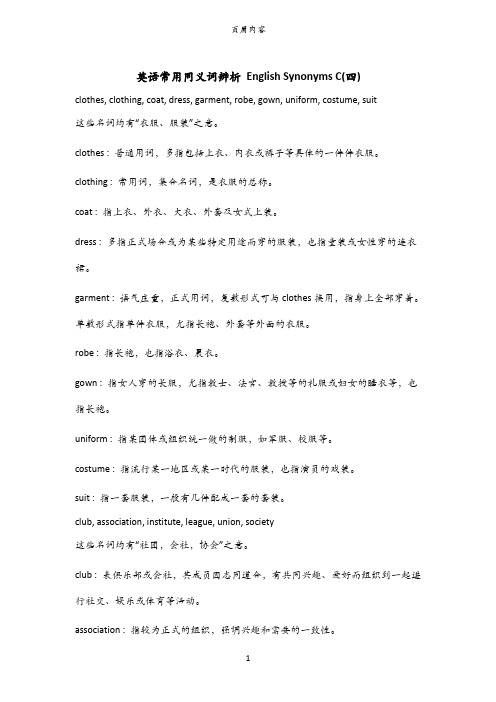
英语常用同义词辨析English Synonyms C(四)clothes, clothing, coat, dress, garment, robe, gown, uniform, costume, suit这些名词均有“衣服、服装”之意。
clothes : 普通用词,多指包括上衣、内衣或裤子等具体的一件件衣服。
clothing : 常用词,集合名词,是衣服的总称。
coat : 指上衣、外衣、大衣、外套及女式上装。
dress : 多指正式场合或为某些特定用途而穿的服装,也指童装或女性穿的连衣裙。
garment : 语气庄重,正式用词,复数形式可与clothes换用,指身上全部穿着。
单数形式指单件衣服,尤指长袍、外套等外面的衣服。
robe : 指长袍,也指浴衣、晨衣。
gown : 指女人穿的长服,尤指教士、法官、教授等的礼服或妇女的睡衣等,也指长袍。
uniform : 指某团体或组织统一做的制服,如军服、校服等。
costume : 指流行某一地区或某一时代的服装,也指演员的戏装。
suit : 指一套服装,一般有几件配成一套的套装。
club, association, institute, league, union, society这些名词均有“社团,会社,协会”之意。
club : 表俱乐部或会社,其成员因志同道合,有共同兴趣、爱好而组织到一起进行社交、娱乐或体育等活动。
association : 指较为正式的组织,强调兴趣和需要的一致性。
1institute : 指为专门的目标而建立的学会或研究所。
league : 指为了共同的目的和利益而组成的社团、同盟或联合会。
union : 多指工会,也指学会或协会。
society : 可与association换用,但前者的宗旨更严格,会员之间联系更紧密,活动更积极。
cold, cool, chilly, frosty, freezing, icy这些形容词均含“冷、凉”之意。
常用同义词辨析H-I
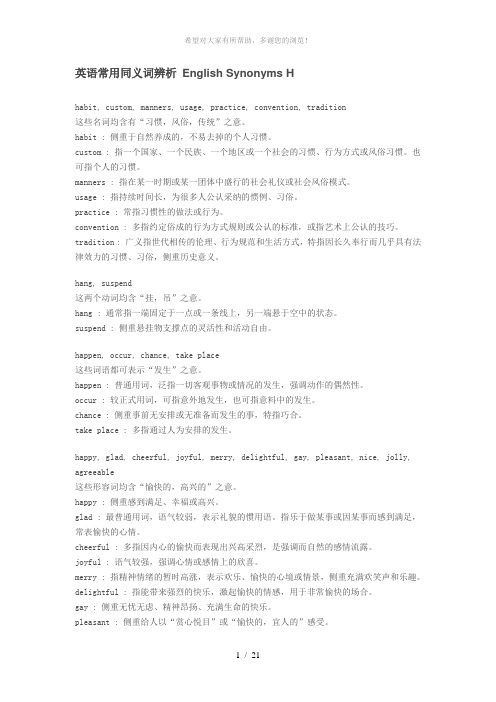
英语常用同义词辨析English Synonyms Hhabit, custom, manners, usage, practice, convention, tradition这些名词均含有“习惯,风俗,传统”之意。
habit : 侧重于自然养成的,不易去掉的个人习惯。
custom : 指一个国家、一个民族、一个地区或一个社会的习惯、行为方式或风俗习惯。
也可指个人的习惯。
manners : 指在某一时期或某一团体中盛行的社会礼仪或社会风俗模式。
usage : 指持续时间长,为很多人公认采纳的惯例、习俗。
practice : 常指习惯性的做法或行为。
convention : 多指约定俗成的行为方式规则或公认的标准,或指艺术上公认的技巧。
tradition : 广义指世代相传的伦理、行为规范和生活方式,特指因长久奉行而几乎具有法律效力的习惯、习俗,侧重历史意义。
hang, suspend这两个动词均含“挂,吊”之意。
hang : 通常指一端固定于一点或一条线上,另一端悬于空中的状态。
suspend : 侧重悬挂物支撑点的灵活性和活动自由。
happen, occur, chance, take place这些词语都可表示“发生”之意。
happen : 普通用词,泛指一切客观事物或情况的发生,强调动作的偶然性。
occur : 较正式用词,可指意外地发生,也可指意料中的发生。
chance : 侧重事前无安排或无准备而发生的事,特指巧合。
take place : 多指通过人为安排的发生。
happy, glad, cheerful, joyful, merry, delightful, gay, pleasant, nice, jolly, agreeable这些形容词均含“愉快的,高兴的”之意。
happy : 侧重感到满足、幸福或高兴。
glad : 最普通用词,语气较弱,表示礼貌的惯用语。
指乐于做某事或因某事而感到满足,常表愉快的心情。
English Synonyms L

label, tag这两个名词均含“标签”之意。
label : 指上面标明货主姓名、地址及货物名称、重量、尺寸等内容的标签。
tag : 多指临时系上的标签。
lack, need, want, require这些动词均有“缺少、短少”之意。
lack : 指完全短缺或数量不足。
need : 语气较重,指需要必不可少的东西,强调急需。
want : 侧重缺少某种必需之物,或个人渴望得到的东西。
require : 使用广泛,语气较轻。
强调急需时可与need换用,但有时暗示所需的人或物是完成某一任务必不可少的。
lack, want, absence, shortage, scarcity这些名词均含“缺乏,不足”之意。
lack : 普通用词,指部分或完全的不足。
want : 指完全或短缺某物,侧重缺少之物是必需的东西。
使用范围比lack窄些。
absence : 指某物根本不存在或完全短缺,或某人虽存在,但未到现场。
shortage : 指不足,但侧重达不到规定的,需要的或已知应有的数量。
scarcity : 指产量不足或缺乏某物难以应付或满足需要。
lame, cripple这两个动词均含“使跛,使残废”之意。
lame : 普通用词,指因受伤或本身的生理缺陷而使人的身体致残,着重行走时的不便。
cripple : 正式用词,语气较强。
多指因伤、体弱或疾病等所导致的永久性残废,常为肢体不全,行走不便,甚至移动身体也困难。
lamp, light这两个名词均有“灯”之意。
lamp : 通常指以油、气或电为能源的照明设备,一般有罩。
light : 普通用词,含义广泛。
泛指一切供照明的灯,多指电灯。
laguage, speech, tongue, dialect, idiom, slang这些名词均含“语言”之意。
laguage : 普通用词,含义广。
指人的语言或文字,或动物的语言。
既可指口头或书面语言,也可指手势语等。
作文素材积累初中200字加赏析
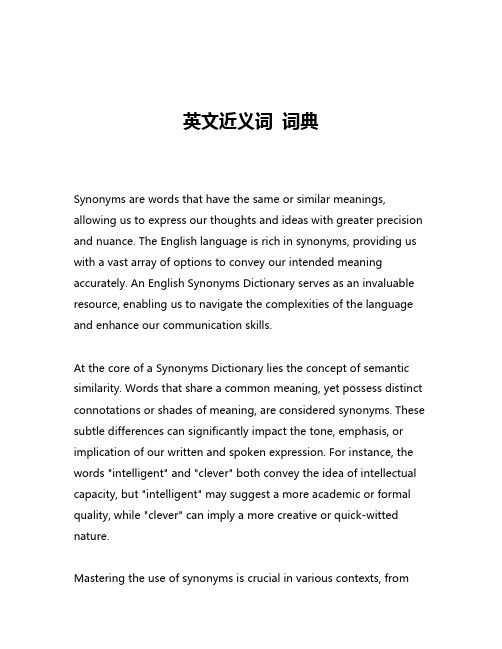
英文近义词词典Synonyms are words that have the same or similar meanings, allowing us to express our thoughts and ideas with greater precision and nuance. The English language is rich in synonyms, providing us with a vast array of options to convey our intended meaning accurately. An English Synonyms Dictionary serves as an invaluable resource, enabling us to navigate the complexities of the language and enhance our communication skills.At the core of a Synonyms Dictionary lies the concept of semantic similarity. Words that share a common meaning, yet possess distinct connotations or shades of meaning, are considered synonyms. These subtle differences can significantly impact the tone, emphasis, or implication of our written and spoken expression. For instance, the words "intelligent" and "clever" both convey the idea of intellectual capacity, but "intelligent" may suggest a more academic or formal quality, while "clever" can imply a more creative or quick-witted nature.Mastering the use of synonyms is crucial in various contexts, fromacademic writing to creative expression. In academic discourse, the ability to utilize a diverse range of synonyms can elevate the quality of one's writing, demonstrating a command of the language and a nuanced understanding of the subject matter. Synonyms can help writers avoid repetition, add depth and complexity to their arguments, and convey their ideas with greater precision.Similarly, in creative writing, the strategic use of synonyms can enhance the richness and depth of literary works. Authors can leverage synonyms to create vivid imagery, evoke specific emotional responses, or convey the unique voice and personality of their characters. The skillful deployment of synonyms can elevate the literary quality of a text, captivating readers and leaving a lasting impression.Beyond the realms of academia and creative expression, synonyms play a crucial role in everyday communication. In our daily interactions, the ability to select the most appropriate synonym can help us communicate more effectively, avoid misunderstandings, and convey our intended meaning with clarity. Whether we are engaging in professional discussions, negotiating agreements, or expressing our personal thoughts and feelings, the judicious use of synonyms can enhance the clarity, persuasiveness, and impact of our communication.A Synonyms Dictionary serves as an invaluable tool in navigating the complexities of the English language. These comprehensive reference works provide users with a wealth of information, including detailed definitions, contextual usage examples, and the relationships between synonymous terms. By consulting a Synonyms Dictionary, individuals can expand their vocabulary, refine their language skills, and develop a nuanced understanding of the subtle differences between words.Moreover, the availability of digital Synonyms Dictionaries has made this resource more accessible and user-friendly than ever before. Online platforms and mobile applications offer seamless access to a vast database of synonyms, allowing users to quickly and efficiently find the most appropriate word for their needs. These digital tools often incorporate advanced features, such as search filters, thesaurus-style groupings, and even suggestions for related or contrasting terms, further enhancing the user experience.The importance of a Synonyms Dictionary extends beyond individual language proficiency. In the realm of professional communication, these resources are indispensable for writers, editors, translators, and language professionals. By providing a comprehensive understanding of synonymous terms, a Synonyms Dictionary enables these individuals to produce high-quality, polished, and nuanced content that effectively conveys the intended message.In the field of language education, a Synonyms Dictionary serves as a valuable pedagogical tool. Instructors can leverage these resources to help students develop a deeper appreciation for the richness of the English language, expand their vocabulary, and enhance their ability to communicate with precision and clarity. By encouraging the exploration and application of synonyms, educators can foster a more sophisticated and versatile command of the language among their students.Furthermore, the study of synonyms and their usage can contribute to the broader understanding of language evolution and the dynamic nature of linguistic systems. Analyzing the subtle shifts in meaning and connotation between synonymous terms can provide insights into the cultural, historical, and social factors that shape the development of a language over time. This knowledge can inform linguistic research, language policy, and the preservation of linguistic diversity.In conclusion, an English Synonyms Dictionary is an indispensable resource that empowers us to navigate the complexities of the language with greater precision and nuance. By understanding the relationships between synonymous terms and their contextual usage, we can elevate the quality of our written and spoken expression, enhance our communication skills, and contribute to the broaderunderstanding of language. As we continue to explore and utilize the wealth of synonyms available in the English language, we unlock new possibilities for self-expression, intellectual discourse, and cultural exchange.。
- 1、下载文档前请自行甄别文档内容的完整性,平台不提供额外的编辑、内容补充、找答案等附加服务。
- 2、"仅部分预览"的文档,不可在线预览部分如存在完整性等问题,可反馈申请退款(可完整预览的文档不适用该条件!)。
- 3、如文档侵犯您的权益,请联系客服反馈,我们会尽快为您处理(人工客服工作时间:9:00-18:30)。
idea, concept, conception, thought, notion, impression这些名词均有“思想、观点、观念”之意。
idea : 最普通常用词,几乎适用于任何方面的思维活动。
concept : 指从众多实例中通过概括、归纳而形成的对事物本质、全貌及其内部联系的概念或看法。
conception : 通常指个人或一些人所持有的具体概念或念头,也可指概念的形成过程,含一定的想象和感情色彩意味。
thought : 指以推理、思考等智力活动为基础的心理思维活动及其结果。
notion : 指的是一种模糊的,变化的莫测的想法,无可靠的基础,未经深思熟虑的观点。
impression : 指外部刺激在思想中所产生的印象。
identify, recognize, make out这些动词均含“认出,识别”之意。
identify : 指辨别、确定人的身份或物品的归属等。
recognize : 指所辨认的人或物多是以前所熟悉的。
make out : 通常指通过人的感觉器官来辨别事物。
idle, lazy这两个形容词均有“闲散,懒惰”之意。
idle : 通常指不忙,无事可干,一般不含应责备之意。
lazy : 指好逸恶劳,贪闲偷懒,或不愿学习或工作等,常含应受责备之意。
if, whether这两个连接词均含“是否”之意。
if : 作“是否”解时,多用于口语,引出宾语从句,不能直接跟or not连用。
whether : 多用于书面语中,可与or或or not连用,除引出宾语从句外,还可引出主语从句、表语从句、同位语从句或与不定式连用。
ignorant, illiterate这两个形容词均可表示“无知的”之意。
ignorant : 指一般的无知或指不知道某个具体的事。
illiterate : 指不识字的人或没有文化的人。
ill, sick这两个形容词均有“生病的”之意。
ill : 在英国较常用,指“生病”时,通常作表语,不可作定语。
在美国,ill用作表语时可与sick 换用。
sick多用于美国,作“生病”解时,既可作表语,也可作定语。
在英国,sick作表语,不指生病,而指“恶心、呕吐”。
illness, sickness, disease, complaint这些名词均有“疾病”之意。
illness : 不具体指,而是泛指一切疾病,强调生病的时间或状语,语体较sickness正式一些。
sickness : 较口语化,可与illness换用,但还可表示“恶心”。
disease : 指具体的疾病,且通常较严重,发病时间也较长。
complaint : 现代英语中,既可指症状,也可指疾病。
imagination, fancy, fantasy这些名词均含有“想象,幻想”之意。
imagination : 含义广,一般不含贬义。
可指认真、带有启发性的想象,也可指凭记忆的想象或凭空想象事物的能力。
fancy : 指脱离实际的幻想或幻想力,常暗含所想象的东西近乎怪诞的意味。
fantasy : 指与现实完全脱节,荒诞离谱、稀奇古怪的想象。
immediately, instantly, presently, directly, shortly, soon, at once, right away这些副词或副词词组均有“立刻,马上”之意。
immediately : 指做完一件事后,立即就做另一件事,中间一般没有明显的时间间隔。
instantly : 指恰恰就在此刻,一秒钟也没耽误。
presently : 指不久、即将。
directly和immediately同义,指毫无迟疑。
shortly和soon同义,指动作发生或完成的速度之快。
soon : 常用词,指行动快,完成速度快。
at once : 口语中常用,语气强烈,指时间紧迫,一刻也不能耽误。
right away : 主要用于美国英语,语气稍弱于at once,强调动作迅速。
immerse, dip, duck, plunge, submerge这些动词均有“沉浸,浸入”之意。
immerse : 侧重全部被液体所覆盖,也可用于比喻意义。
dip : 指部分地、暂时地或轻微地放进液体,多暗示一种谨慎或试探性的动作。
duck : 指把头伸进水中,或指游泳时开玩笑地把一个人的头按入水中。
plunge : 暗示迅速而有力的动作,但浸入不一定很深。
submerge : 指长时间的完全浸入、潜入,强调浸入液体深层。
impartial, just, fair, neutral, objective这些形容词均有“公正的,公平的,不偏不倚的”之意。
impartial : 侧重对任何人或任何一方没有成见或偏袒。
just : 多用于庄重场合,指不受个人利益得失或感情倾向的影响,侧重按照公认的准则或标准处理问题。
fair : 普通常用词,指不偏不倚地对待人和物,侧重不受个人感情、偏见或利益所影响。
neutral : 强调持中立态度,不偏袒任何一方,甚至不作最后的裁决。
objective : 着重客观、真实,不为个人偏见、兴趣、感情或看法所左右。
improve, better, perfect, refine这些动词均有“改进,改善”之意。
improve : 最常用词,多指状态或性质上的深刻或重要改进,也可指自身能力的提高。
better : 多用于口语,指适当地改善原来并非很差的状态或性质,也指社会地位、经济状况的改善。
perfect : 语义强,通常指使方法、技术等达到完善美好的境地。
refine : 侧重指使语言、仪态等变得文雅、优美,也可指技艺等的提高。
indeed, really, truly, actually这些副词均有“确实地,真正地”之意。
indeed : 一般用于肯定或证实对方所说的话,多承接前言,也用来加强或肯定自己说话的语气。
really : 主要用于强调与事实或现实不相违背,也可表示不快、惊奇或某种含蓄的怀疑。
truly : 强调客观存在的真实性,没有任何虚假。
actually : 侧重于实际的事,而不是凭空想象或推测的事。
indispensable, essential, necessary, requisite这些形容词均有“必不可少的,必需的”之意。
indispensable : 语气强,侧重指绝对必要性或不可缺少性。
essential : 指对事物本身性质具有决定性的重要性,暗含不可缺少,否则便无法存在。
necessary : 最常用词,侧重由客观因素决定的某种需要,强调不可避免,但并非绝不可缺少。
requisite : 正式用词,特指为实现某一目的或得到某种结果而应有的需要,有时可与necessary换用。
induce, persuade, urge, convince, counsel, coax这些动词均有“劝说,劝导,劝诱”之意。
induce : 指用讲道理来使某人做某事。
persuade : 普通用词,指通过劝说、感情交流等而使对方做劝说者所希望的事。
urge : 语气强,指不断地热情地规劝诱导。
convince : 指凭行动、事实或言语使他人从思想感情上信服。
counsel : 较正式用词,指对一些较重大事情所提出的劝告。
有时也用于非正式场合,但仍强调严肃的一面。
coax : 指用好话善意或耐心劝诱、哄骗某人做某事。
induction, inference这两个名词均有“推理、推论”之意。
induction : 指从一系列具体的事实概括中一个一般的结论,即归纳法。
inference : 侧重从前提得出结论的过程。
inexpensive, cheap这两个形容词均含“便宜的、价廉的”之意。
inexpensive : 指商品价格公道,数量和价格相当。
cheap : 普通用词,既可指物美价廉,又可指价格低但质量却不怎么样。
infer, deduce, conclude, gather, judge这些动词均含“推断”之意。
infer : 指从已提供的论据或从已接受的前提出发而推断出的结论。
deduce : 指有充分根据的推论,也指逻辑学上的演绎。
conclude : 指得出符合逻辑的结论。
gather : 指从听到的情况推测、判定。
judge : 多指经过仔细鉴定或评价之后作出决断。
inform, acquaint, notify, advise这些动词都有“通知、告知”之意。
inform : 普通用词,指传达事实或信息,或指经过研究或调查而获得的事实或信息。
acquaint : 指提供有关信息或情况使某人熟悉某些过程或复杂的情况。
notify : 指正式通知需要注意的事情。
advise : 指正式通知某件重要事,所通知的事情与被通知的人有关。
information, data, message这些名词都含有“资料、信息”之意。
information和data作“资料”解时,前者仅指所获得、提供或描述的慨况,而不指具体的数据或资料,后者则指具体的资料。
data是datum的复数形式,本义指作为计算和测量基础的资料。
message : 指通过书写、谈话和信号等方式所进行的通讯“信息”。
inherent, essential这两个形容词均有“内在的、本质的”之意。
inherent : 指物体本身固有的、不能与该物体分割的某种特性。
essential : 指决定所属事物存在的关键因素。
inner, inside, interior, internal, inward这些形容词均含“内部的,内在的”之意。
inner : 含义广泛,指事物中心或接近中心的部位,也可指内心隐密的活动。
inside : 多指处于某物内部或靠近内部,常可与inner换用,可引申指内幕的,秘密的。
interior : 指某物的内部,尤指某物的内侧;也可指内地的或国内的。
internal : 书面用词,医学上多用,指事物的内部,也可指国内的或内政的。
inward : 指朝着中心或内部方向的,侧重方向而不是位置;也可指内心的隐密活动。
inquiry, investigation, research, survey这些名词均有“调查”之意。
inquiry : 普通常用词,指正式调查,也指一般的打听或查询。
investigation : 一般指有系统的调查以得到希望发现或需要知道的事。
research : 指科学工作者等为揭示自然规律或获取某个领域的新知识而进行长时间的调查研究。
survey : 多指为写书面报告而进行的民意测验或调查。
insist, persist, persevere, adhere, cling这些动词均有“坚持”之意。
